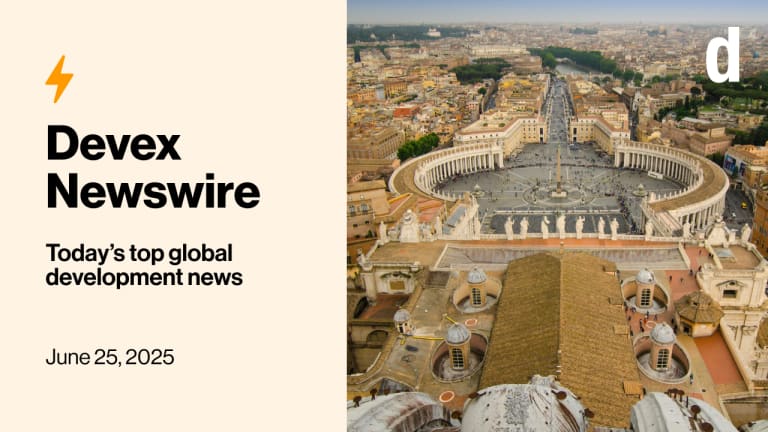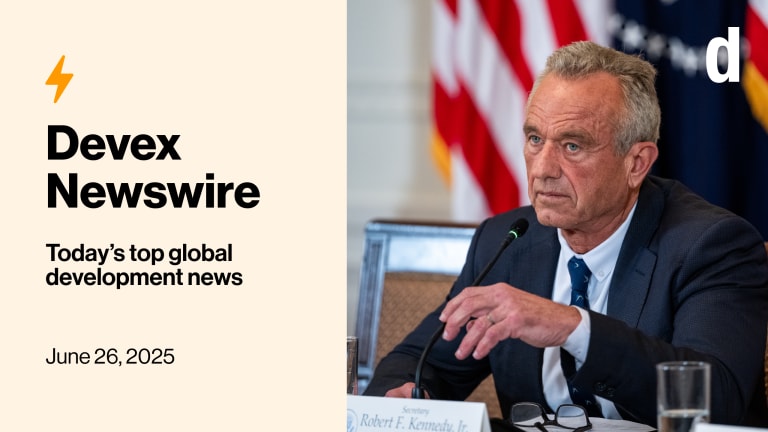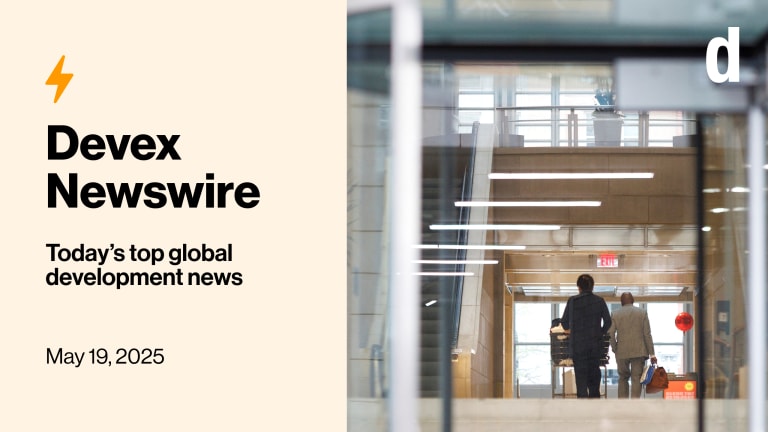
A tweet praising COVAX inspired an angry response echoing long-standing complaints that the initiative to ensure equitable access to vaccines exposed just how unequal the world can be.
Also in today’s edition: A top World Health Organization official leaves the agency with a mix of regret and hope. Plus, USAID breaks spending records in 2022.
Flame war
The checkered legacy of COVAX is among the topics at two major global events this week: one in Geneva and the other in Kigali. And it’s already sparked some Twitter intrigue (which, for once, has nothing to do with Elon Musk).
This is a preview of Newswire
Sign up to this newsletter for an inside look at the biggest stories in global development, in your inbox daily.
Seth Berkley, CEO of Gavi, the Vaccine Alliance, touted the virtues of COVAX in a tweet last week after the Gavi board voted "in principle" to integrate COVID-19 vaccination in Gavi's regular programming from 2024.
Berkley — whose nonprofit, along with the Coalition for Epidemic Preparedness Innovations and the World Health Organization, spearheaded COVAX — hailed it as “a blueprint of how to deliver vaccines at scale in an emergency to low-income countries.”
Dr. Olusoji Adeyi — the president of Resilient Health Systems who serves on the faculty at Johns Hopkins Bloomberg School of Public Health and who previously worked at the World Bank — took to the platform to dispute what he labeled as Berkley’s “false assertion,” tweeting that “#COVAX failed: hypercentralized planning, captured/crippled by rich countries & special interests, sidelining of the Global South, & fickle #charity disguised as devt #finance. Time for candor & overhaul, not spin & hubris, from @Gavi.”
Ouch.
Proving that he’s not just outspoken behind a keyboard, Adeyi didn’t mince words during a panel at the 2nd International Conference on Public Health in Africa, my colleague Sara Jerving reports from Kigali.
At a pre-conference session on Monday, Adeyi blasted COVAX as a form of “narcissistic charity,” saying it centers around “the very crippling, congenital defect” that some parts of the world have “The divine right to dictate to others what they can have, when they can have it, and on whose terms they can have it.”
COVAX has delivered more than 1.8 billion vaccine doses to nearly 150 countries, but it was plagued early on by high-income countries hoarding shots as African countries faced overwhelmed health facilities. Since then, demand in low-income countries has waned, even though large parts of the world — especially across the African continent — remain unvaccinated.
Asked how he’d like to see COVAX restructured, Adeyi said that governance should be regional, not global, and African nations must end “dependency on the global north” and put up more money toward pandemic preparedness and response.
And if African nations learn anything from this pandemic, it’s that they shouldn’t want another COVAX during the next one, Adeyi said, calling it “disappointing to hear some of the revisionism that is coming out of Geneva on this in the last few days.”
From the archives: Is COVAX still relevant as a vaccine sharing initiative?
+ Sign up to Devex CheckUp, our free, weekly global health newsletter.
Nordic note
While Sara covers the latest out of Kigali, my colleague Amruta Byatnal is in Geneva for the Effective Development Co-operation Summit — though I suspect Adeyi might have some objections to the “effective” part of that title.
Speaking on the sidelines of the summit, Norwegian Ministry of Foreign Affairs State Secretary Bjørg Sandkjær tells Amruta that the country is on board with Gavi’s decision to phase out COVAX — although the nonprofit will continue to provide vaccines to the lowest-income countries if they want them.
"At this point in time, we feel that the emergency part of the response is over. … It's not sustainable to keep these emergency structures going,” says Sandkjær.
Norway was also key in setting up an independent evaluation of the program and learned some lessons from it that don’t quite jibe with Berkley’s take: “The evaluation clearly tells us that it would be important for the next response to be more inclusive — more global south, more civil society, and more representation," says Sandkjær.
Background reading: ACT-A set to transition to a new phase
Trust issues
Trust — and the lack of it — kept coming up on the first day of the summit in Geneva.
"The lessons of the pandemic and current global uncertainties are teaching us that everyone, rich and poor, is affected when there is a breakdown in trust,” Rwandan President Paul Kagame said at the opening plenary.
But not everyone sees trust as a positive. Anas El Hasnaoui, a representative of the CSO Partnership for Development Effectiveness from Morocco, believes that authorities use trust "as a weapon."
"When the governments say trust us, what they're saying is don't question us," Hasnaoui tells Amruta.
The lack of trust was also evident in what went unsaid: We’ve heard little discussion in Geneva on donor country politics — and what that means for projects on the ground. But a lack of trust by parliaments and congress can lead to donors making very risk-averse and highly inefficient decisions.
No regrets … well, a few
A top WHO official whose job was to ensure access to medicine and health products has mixed feelings about how the Geneva-based body handled the pandemic, expressing regret that more wasn’t accomplished but hope that it still can be.
Dr. Mariângela Simão admits to my colleague Jenny Lei Ravelo that “We did what we did to the best of our abilities, and it was not enough.”
In a wide-ranging, candid interview as she prepares to retire from WHO, Simão talked about how the pandemic helped elevate the problem of equitable access. At the same time, Simão said she regrets not having done more when high-income countries snapped up COVID-19 health products earlier than COVAX could because they had deeper pockets.
As for advice to her successor? If you make mistakes, don’t make the same ones.
Meanwhile, Jenny has the breaking news on some new staffing changes at WHO.
Q&A: Dr. Mariângela Simão on COVID-19 regrets and unfinished business
ICYMI: Here's everyone who is leaving WHO leadership
Wait, does this also mean mo’ problems?
The U.S. Agency for International Development shattered records in 2022, spending $35.5 billion through acquisitions and assistance — roughly $8.7 billion more than in 2021, my colleague Omar Mohammed writes. The jump in large part stems from the pandemic and war in Ukraine.
Omar has a detailed breakdown of USAID’s plans for 2023.
Read: A record year for USAID — takeaways from its latest business forecast (Pro)
Dig deeper: USAID business forecast for Q1 2023 (Pro)
+ Unlock Devex Pro pieces by starting your 15-day free trial of Pro membership today.
The lesson of less
No. 5 in Devex Global Voices 2022: Arran Hamilton of Cognition Education and John Hattie of the Hattie Family Foundation offer a starkly realistic take on the need for education systems around the world to do more with less money given the economic situation caused by the COVID-19 pandemic.
In other news
The International Monetary Fund has inked a $3 billion bailout for Ghana, though the deal must still be approved by the organization’s board. [Bloomberg]
The Group of Seven leading economies has formed a new international climate club with the goal of accelerating the implementation of the Paris Agreement. [AP News]
The European Union has agreed to send Ukraine a financial aid package worth €18 billion ($18.9 billion), while the G-7 announced an initiative to create a multiagency platform to coordinate aid for the war-torn nation. [The Washington Post and Reuters]
Sign up to Newswire for an inside look at the biggest stories in global development.




